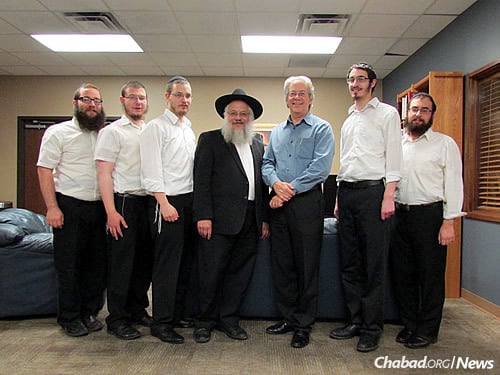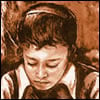Fifth-generation Texan Adam Kaman has long toyed with the idea of studying in yeshivah. But with a growing family and full-time job in the corporate offices of an Austin-based food retailer, he has not been able to actualize that dream.
This summer, however, he did manage to spend a week in the mini-yeshivah that comes to the state’s capital every year and which just wrapped up on Monday.
“I took a week off work, and learned from 8 in the morning to 9 at night. It was a very full experience, and I accomplished a lot,” says Kaman, whose wife, Michelle, volunteers at many Chabad events and whose two toddlers attend the Chabad-affiliated Hebrew Preparatory School of Austin. “So many people were popping in at all times to learn, pray or just be with the students. It really brought an excitement to the entire community.”
“The Austin Yeshivah Experience” was born seven summers ago, when yeshivah students Levi and Mendy Levertov (then ages 17 and 20, and studying in Morristown, N.J., and Safed, Israel, respectively) decided to bring some of their fellow students to their hometown for a while. This year, it began on Aug. 2 and concluded on Aug. 22.
“We began by researching what was being done in other cities—like Tulsa, Okla.; Toledo, Ohio; and in Winnipeg—and devised a learning schedule and publicity plan that would work well in Austin,” says Rabbi Mendel Levertov, who has since joined his parents, Rabbi Yosef and Rochel Levertov, co-directors of Chabad Lubavitch of Austin (he directs the Chabad Young Professionals program). “We printed a brochure with class schedules and recruited our friends to come to Austin for a few weeks.”

The Levertovs’ model combined the traditional yeshivah program, which includes a significant amount of one-on-one independent chavruta study, with daily classes offered during lunch and then once again in the evening.

Every class is delivered by one of the students. “These guys are hoping to become Chabad rabbis in the not-so-distant future,” says Levertov, who helps the young men with their presentations, “so they value the opportunity to work on their public speaking and other skills as they prepare and deliver classes on a host of Torah topics.”
This year’s classes—many of them geared specifically towards young professionals like Kaman—include a variety of subjects, from prison reform and the Jewish approach to democracy (both apropos in an election year) to “Jews on the moon.”
Levertov insists that the biggest draw is the unadulterated study of Chassidic and Talmudic texts, together with the rabbinical students, which he refers to as “the backbone of Chabad yeshivah life.”
‘New Faces Every Year’
Over the years, he reports, the annual program has had a significant impact on the community: “The learning draws in new faces every year, and serves to solidify the level of Jewish knowledge and commitment among those already involved.”
He cites the example of an elderly woman who lived estranged from Judaism. She attended regularly for the last five years of her life, and even while ailing in her final year, she still made it to class. In fact, her yeshivah experience prompted her to attend High Holiday services and enjoy a meal in the sukkah during the holiday of Sukkot for the first time in nearly half a century.

The presence of the rabbinical students and those who join them has also meant that the community has twice-daily prayer services, something they do not yet have on a year-round basis.
One feature that the community especially enjoys are the Sunday “Grill the Rabbis” barbecues, where local residents pose their toughest Judaism-related questions to the students.
Many members of the community show their appreciation by hosting students for swimming and other activities. One man known for his Israeli-style falafel makes it a point to prepare the students his signature dish at least once during the session; another treats them to a night of homemade artisanal pizza.
This year’s cohort included 21-year-old Shmuel Levertov and three of his yeshivah buddies: Tzemach Shemtov, Mendel Weiss and Yanky Werner.
The program is supported by the Tocker Foundation, directed by Darryl Tocker, who enjoys the fact that these rabbis come to teach and educate. The students are generally received by local public officials and others as part of the experience.
“Just spending my days with these guys has given me a lot,” says Kaman. “It’s not just that we learned many texts together, but simply being around them—and seeing how they approach life—is invaluable to me and to our community.”










Join the Discussion